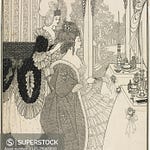Beginning with our Word of the Week, the name of the good and brave Saint Patrick, we have been in the Emerald Isle, and we are there again with the author of our Poem of the Week, the Irish songster Thomas Moore. What to choose? He’s got poems about love — plenty of them, and all of them in celebration of love that endures; about feasting and drinking, but ever in feasting and drinking to what should be remembered with honor; about fighting for the liberty of Ireland, which even in her dark hours Moore never gave up on. Fidelity is the thread that runs through Tom Moore’s songs — and though he doesn’t sing a lot about religious faith, still that fidelity, a natural virtue, is something to admire. It’s why we can suppose that the souls of faithful soldiers can rise up from the field and greet one another with a good heart, though on earth they fought each for his own country, on opposite sides. And yet I’ve chosen a poem about something I think is even more admirable than that virtue.
Here is the anecdote behind it, as Moore himself recounts it from a History of Ireland: “The people were inspired by such a spirit of honor, virtue, and religion, by the great example of [King] Brien, and by his excellent administration, that, as a proof of it, we are informed that a young lady of great beauty, adorned with jewels and a costly dress, undertook a journey alone from one end of the kingdom to the other, with a wand only in her hand, at the top of which was a ring of exceeding great value; and such an impression had the laws and government of this Monarch made on the minds of all the people, that no attempt was made on her honor; nor was she robbed of her clothes or jewels.” I don’t know right now whether anybody would attempt such a journey alone in the subway from one end of New York City or London to the other, let alone on foot across a whole kingdom. In any case, it inspired Moore to write a song in honor of the Irish sense of honor, and as I say, I like hearing people stand up for their native land, as my cousins in Italy do. It isn’t so much a political thing as a feeling for kindred and the home.
I remember once when I was at Princeton, working in the Student Center for a while as a short-order cook, and I met a kid from Kansas, and we got to talking about where he came from. “The biggest thing I had to get used to, coming here,” he said, “was the trees.” The trees? “Yes,” he said. “You have so many of them, and they get in the way of the sky. Back home on the farm, I can go out at night and look up and see nothing but the sky and the stars.” I’d never seen such a thing, but I could understand why he loved it, and maybe also some of that love applied to the people too, because life in Kansas wasn’t going to be just like life in New Jersey, which was different in turn from life in the mountains of Pennsylvania, where I grew up.
It’s right that Moore called his book “Irish Melodies,” because that’s what he was at heart, a composer of songs to be sung, and plenty of his poems have indeed been set to music. In English, there’s a common metrical form that goes along with folk songs — call it accentual. In accentual meter, you don’t bother with the number of syllables, but only with the number of strong stresses, with this proviso, that you can’t have three unstressed syllables in a row, because inevitably in English you’re going to put a little extra stress on the middle one of those three, and that will mess up your count and your musical measure. In this poem, we’ve got FOUR strong stresses in each line. It’s all right if you lead off with a strong stress, too. The general effect of this sort of thing is often jaunty or rollicking, and that also fits the story very well, as you’ll gather from the bright conclusion. So then, as all the Irishmen in my town used to cheer at this time, Eirinn go brach! Ireland — the real Ireland — forever.
Rich and rare were the gems she wore, And a bright gold ring on her wand she bore; But oh ! her beauty was far beyond Her sparkling gems, or snow-white wand. "Lady ! dost thou not fear to stray, So lone and lovely, through this bleak way? Are ERIN'S sons so good or so cold, As not to be tempted by woman or gold?" "Sir Knight ! I feel riot the least alarm, No son of ERIN will offer me harm. For though they love woman and golden store, Sir Knight ! they love honour and virtue more!" On she went, and her maiden smile In safety lighted her round the green isle. And blest for ever is she who relied Upon ERIN'S honor, and ERIN'S pride!
Listen to this episode with a 7-day free trial
Subscribe to Word & Song by Anthony Esolen to listen to this post and get 7 days of free access to the full post archives.













